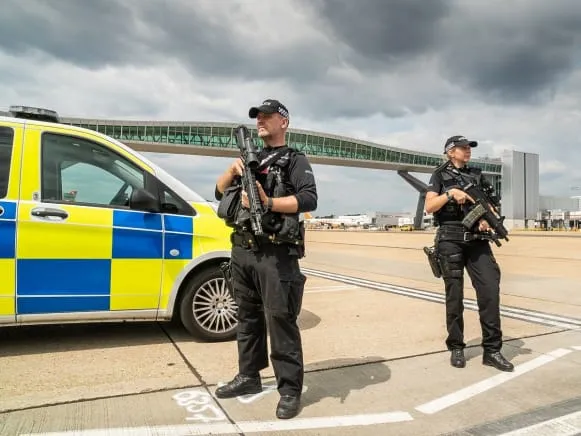
Damaged drones ruled out of Gatwick inquiry
Dec 30, 2018

The inquiry into the Gatwick drone incident has determined that damaged drones will not be considered relevant evidence. Following a thorough investigation, authorities concluded that the drones recovered from the scene were not involved in the disruption caused at the airport in late 2018. This decision has significant implications for understanding the events that led to widespread flight cancellations and security concerns. The focus of the inquiry will now shift to other aspects of the incident, as the search for the true source of the drone activity continues amid ongoing scrutiny and public interest.
In a recent development concerning the Gatwick inquiry, authorities have announced that "damaged drones" have been ruled out as a factor in the incidents that disrupted operations at one of the UK’s busiest airports. This decision is significant as it narrows down the investigation and allows for a more focused approach to understanding the events that took place.
Background of the Gatwick Incident
In December 2018, "Gatwick Airport" experienced significant disruptions when drone sightings led to the closure of the airport for several days. Thousands of passengers were affected, and the incident raised numerous questions about "drone safety" and regulations. As the inquiry progressed, the focus shifted to determining the source and cause of the drone sightings.
Investigation Findings
The recent ruling regarding the "damaged drones" eliminates a potential avenue of investigation. Inquiries revealed that the drones found at the scene were either intact or in working condition, thus ruling out the possibility that damaged units contributed to the chaos. This finding is crucial as it helps to clarify the nature of the incidents and the capabilities of the drones involved.
Understanding Drone Regulations
The ruling on "damaged drones" is also an important reminder of the current landscape of "drone regulations" in the UK. As the usage of drones becomes more prevalent, regulations are evolving to ensure safety and compliance. The UK Civil Aviation Authority (CAA) has been actively working on implementing stricter guidelines for drone operators to prevent similar incidents in the future.
Implications for Airport Security
With the ruling against "damaged drones", airport security measures may need to adapt. Gatwick and other airports are likely to increase their vigilance and possibly invest in advanced technology to detect and neutralize drone threats. This could lead to the implementation of more sophisticated "drone detection systems", which would enhance overall airport security.
Table of Drone Regulations in the UK
| Regulation | Description | Implications |
|---|---|---|
| Registration | All drone operators must register with the CAA. | Increased accountability for drone users. |
| Flight Restrictions | Drones must not fly above 400 feet and must stay away from airports. | Improved safety near air traffic. |
| Insurance Requirements | Drone operators must have liability insurance. | Protection for third-party damages. |
| Training and Certification | Commercial drone pilots must undergo training and obtain certifications. | Ensures skilled operation of drones. |
Future of Drone Technology and Safety
The ruling on "damaged drones" at Gatwick serves as a pivotal moment in the ongoing dialogue about drone technology and safety. As drone technology continues to evolve, it is essential for regulators to keep pace with innovations to ensure that safety measures are not compromised. The potential for "drone delivery services" and other applications is vast, but it must be balanced with the need for stringent regulations to protect public safety.
Public Perception and Trust
Public perception of drones is mixed, with many expressing concerns about safety and privacy. The Gatwick incident has heightened these concerns, leading to calls for more robust regulations and enforcement. It is vital for authorities to communicate effectively with the public regarding the measures being taken to address these issues and restore trust in drone technology.
Conclusion
The ruling on "damaged drones" being excluded from the Gatwick inquiry is a critical step in understanding the complexities of drone incidents at airports. As investigations continue, it is essential for the aviation industry, regulatory bodies, and the public to engage in constructive dialogue about the future of drone regulations and safety. By fostering a cooperative environment, stakeholders can work towards ensuring that drone technology is both innovative and safe for all.
Related Articles

Explore Thailand: The Best Islands to Visit for Paradise, Adventure, and Relaxation

The Ultimate Guide to the Best Islands in Thailand for Your Next Getaway

Do babies need passports? How to get a passport for a newborn

How to get a U.S. passport fast: here’s how to expedite the process

What is Mobile Passport Control: 5 reasons why you should use it

SENTRI vs. Global Entry: A detailed guide

Do you need a passport to go to the Bahamas? Let’s find out

Do you need a passport to go to Mexico? A detailed guide

Do you need a passport to go to Canada? We got the answer

Do You Need a Passport for a Cruise: An Essential Travel Guide

Booster Seat Requirements: All the Rules to Follow in Your Rental Car

What Are the World’s Most Powerful Passports, and How Does Yours Rank?

How to Take a Passport Photo at Home: A Helpful Guide

You've got to have heart! Southwest's new livery

Your opinion: Should water be free on low cost carriers?

Young women bolder than guys as solo travellers
